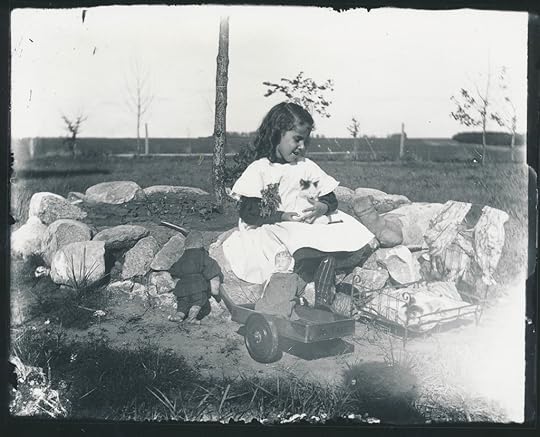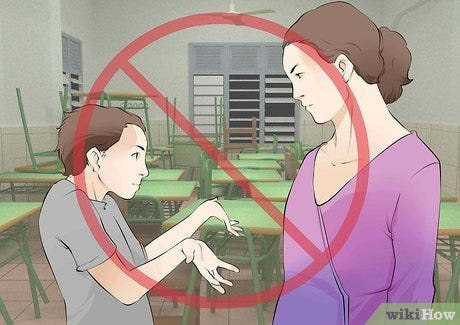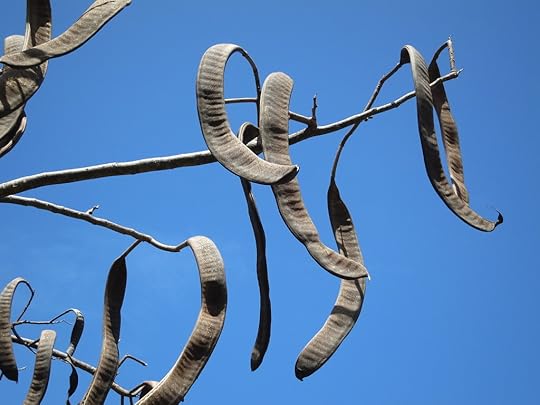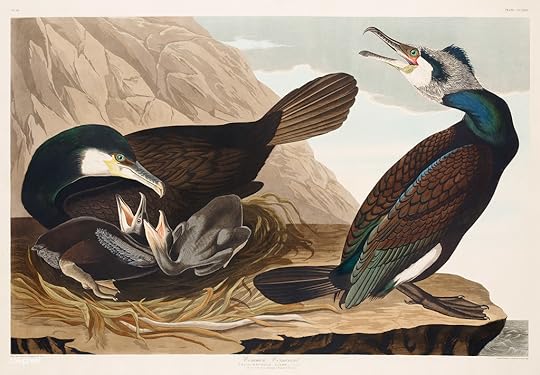Robin Helweg-Larsen's Blog, page 18
December 23, 2024
Helena Nelson, ‘Invitation’
a homage to Donne’s ‘Nocturnal on St Lucies day’

The shortest day is soon. Time for a pact.
I don’t mean with Saint Lucy (Lucy’s day
falls earlier in the month). But hey
let’s meet and talk and counteract
such darkness of the heart
as coincides with winter’s formal start.
We can read Donne’s ‘Nocturnal’, view its art,
its provenance and what on earth it means.
Location doesn’t matter. We have screens.
Nobody writes a poem now like that —
not something so precise and well controlled.
Of course, we hear what we are told:
the world is round, a rhyme is flat,
‘poetics’ have moved on
and these days no-one wants to write like Donne
who was amazing, right? But dead and gone.
Or not that dead. I’d say he’s still alive
in stanza three and certainly in five.
They call Donne ‘metaphysical’, you know,
a word still popular in jacket blurbs
for living, writing bards where verbs
(or verbiage) propel the flow
but hard now to be sure
whether they mean what Johnson meant. The more
‘meta’ you get with blurbs, the more obscure.
When ‘metaphysical’ foretells a treat
it might be true; it might be mere conceit.
But in ‘Nocturnal’, metaphor leans out
and mystifies. It’s not the usual thing
like glass or compasses or string.
It’s nothing. No thing. Less than nowt.
He says what he is not
in several different ways. In fact, the knot
of nothingness becomes his central plot.
The poet in him can’t forget that ‘none’,
his rhyme for ‘run’, echoes both ‘sun’ and ‘Donne’.
So he’s the sum of everything he feels:
annihilated by the loss of one
without whom he is not a man,
just numb. And yet he still appeals
to logic to make clear
how dark existence is. Yes, she was dear.
Each syllable recounts her loss, his fear,
and this is now and then and now, since this
both the year’s and the day’s deep midnight is.
*****
Helena Nelson writes: “In 1617 when, after the death of his wife, John Donne wrote ‘A nocturnall upon S. Lucies day, Being the shortest day’, St Lucy’s Day coincided with the winter solstice in the author’s hemisphere. Then they changed the calendar, and these days, Saint Lucy’s Day is 13 December. But the winter solstice falls over a week later (this year 21 December).
“Every year on the solstice, I think about John Donne’s solstice poem, every year it gets more apposite, since it is essentially about death. Last year, I did a formal online discussion about it, and I wrote an invitation using the form that is Donne’s, though obviously for a less serious purpose. It allowed me to think it through. I’m thinking about the poem again today, so here’s the invitation.”
Helena Nelson runs HappenStance Press (now winding down) and also writes poems. Her most recent collection is Pearls (The Complete Mr and Mrs Philpott Poems). She reviews widely and is Consulting Editor for The Friday Poem.
Photo: “John Donne, Poet” by lisby1 is marked with Public Domain Mark 1.0.
December 21, 2024
Sonnet: Rick Mullin, ‘Shrine to Satan’

The neighbor’s child has built a muddy shrine
to Satan in our yard. And I’m supposed
to cut the lawn? OK, but look at those
croquet clubs that she used (good God, they’re mine)
to pound her pentagrams of chicken bone
into the ground. The handles are unscrewed
from all the hammer heads. It’s kind of shrewd
the way she placed that PlayskoolTM telephone.
Still, little girls should not touch garden tools
or take the plastic rake out of the shed–
she’s tied it with those jump ropes to the tree.
A shattered flower pot. The Barbie head.
Horrific how this child has learned the rules
of Belial for sculpting in debris.
*****
Rick Mullin writes: “The little girl, A., is a friend of our family and was one of three girls that spent most days playing in our yard. One day they split up, each doing their own thing in their own corner of the yard. The Shrine to Satan, as I called it, was crafted by A. The architect of the horror described in this poem is getting married today.”
Rick Mullin’s poetry has appeared in various journals and anthologies, including American Arts Quarterly, Measure, The New Criterion, The Dark Horse, The Raintown Review, Epiphany, and Rabbit Ears: TV Poems. ‘Shrine to Satan’ is from his chapbook “Aquinas Flinched”, Exot books, 2008. His books include Soutine and Sonnets from the Voyage of the Beagle (Dos Madres Press, 2012 and 2014), Lullaby and Wheel (Kelsay Books, 2019), and Huncke (second edition, Exot Books, 2021). He is a painter and retired journalist living in northern New Jersey. His website is rickmullin.com and his art blog is onlyofobjects.wordpress.com
Photo: “Little girl playing with a kitten and dolls.” by simpleinsomnia is licensed under CC BY 2.0.
December 20, 2024
Semi-formal: ‘My Doctir’s Excus’ by Michael R. Burch, age 8

I can eggsplain why Im sick.
Sick as a brick
and my stule is thick.
I came to school
and I caught it from Rick.
Now I’m sick as a brick
and my stule is thick.
I cant do my homework
becus Im sick.
I cant take tests
becus Im a mess.
Blame Rick, the prick!
—signed, my doctir
PS, Thurd grade is hard enuff on kids nervs and bad graids make my simptoms worse! Liten up, doctirs orders!
*****
Michael R. Burch confesses: “I must admit that the whole thing is entirely fictional, and I lied about my age. Poet license! I came up with the poem this morning (December 17, 2024) as soon as I awoke. That happens to me quite bit: having a line in my head as soon as I wake up. I have even composed poems in my sleep a few times. The original poem had normal spelling, but then it occurred to me to turn it into a not-so-artful ‘doctir’s excuse.’
There was no Rick.”
Michael R. Burch’s poems have been published by hundreds of literary journals, taught in high schools and colleges, translated into 22 languages, incorporated into three plays and four operas, and set to music, from swamp blues to classical, 61 times by 32 composers. He is also the founder and editor-in-chief of The HyperTexts.
Illustration: WikiHow: https://www.wikihow.com/Make-Up-a-Good-Excuse-for-Your-Homework-Not-Being-Finished#/Image:Make-Up-a-Good-Excuse-for-Your-Homework-Not-Being-Finished-Step-18.jpg
December 18, 2024
Semi-formal at best, RHL, ‘Remembering Winter’

I remember winter when it was only
Mostly too cold to swim –
The churning suck and drag of waves under the rock.
Yes, there are flowers – there are always flowers –
But, with the poinciana stripped of leaves,
Its pods like forearms thinned and bent with age,
The rattling of sticks, the hiss of wind,
The broken sea stuck futilely on Wash
With endless turning, churning, foaming pulse –
How long can waves beat on a rock before
The tired rock gives up?
Yes, I remember later northern winters –
The bitter satisfaction of a too-thin sun,
Beauty without the joy, light without heat.
Feet always cold, clothes never quite enough;
Skin drying back from fingernails, lips chapped, throat raw,
The smell of damp coats, never fully dry.
I dream of alternating south and north
And never having to be cold again,
Turning, returning, always in the sun –
Or settling in an equatorial land
And swimming year-round, mellowing on the sand
Flattening my temperature, my will,
Soaking up sun, and dreaming I’m asleep.
Bitter it is, the winter argument,
Betrayed by world that slices off the years,
I have no love of winter, and I feel
Trapped, and betrayer of true kids of mine –
But look – they love it, so I’m further trapped,
Bound to the year that crushes as it turns,
And has become their home – are they then kids of mine?
Ice – snow – the winding down of life and year.
And I’ve known other winters all too well –
Where years of spring gave way to years of warmth,
Blossoms to children sparkling in the light,
The wonders of the world’s sharp sense delight;
Then years of fruit, as independent seeds
Form their own thoughts and follow darkening paths
Falling away, on purpose shrivel up,
And days grow shorter, moods swing soft and harsh
Drizzle sets in for weeks, cold in the bones,
Cold in the head, and colder in the heart –
That’s how the years of endless winter start.
Bleakness to bleakness, blackness into black;
Lives dry and crack,
Sap gone from tree and house and bone.
Who knew that emptiness could weigh so much?
Give me the strength to last to Spring, or start my own.
*****
This poem is from decades ago, in one of those periods where life felt bleak. (But such seasons pass!) For a long time I was unsure of the poem because it always feels like sloppiness and cheating when my rants are low on rhythm and rhyme; but George Simmers liked it enough for inclusion in Snakeskin, and that’s more than good enough for me.
Photo: “Shack-Shacks” by Chris Hunkeler is licensed under CC BY-SA 2.0.
December 16, 2024
Unforgettable nonsense: Christopher Isherwood, ‘The Common Cormorant or Shag’

The common cormorant (or shag)
Lays eggs inside a paper bag,
The reason you will see no doubt,
Is to keep the lightning out.
But what these unobservant birds
Have never noticed is that herds
Of wandering bears may come with buns
And steal the bags to hold the crumbs.
*****
There are a couple of anomalies about this poem. First, some people doubt that it is by Christopher Isherwood, because the poem had been circulating anonymously since 1938 but didn’t appear under his name until 1982 in his nonsense-animals collection ‘People One Ought To Know’. But he had actually written the collection as early as 1928, as I gather here. Secondly, cormorants and shags are similar but different birds of the same family, at least in current terminology; however as Wikipedia says, ‘No consistent distinction exists between cormorants and shags. The names “cormorant” and “shag” were originally the common names of the two species of the family found in Great Britain.’ And anyway, it’s a nonsense poem, so who really cares? It is amusing, and easy to memorise because it is in verse.
Illustration: “Common Cormorant from Birds of America (1827) by John James Audubon (1785 – 1851), etched by Robert Havell (1793 – 1878). The original Birds of America is the most expensive printed book in the world and a truly awe-inspiring classic.” by Free Public Domain Illustrations by rawpixel is licensed under CC BY 2.0.
December 14, 2024
Sonnet: Gail White, ‘A Visit on All Saints Day’

Hello. I’ve brought your favorite flowers again.
How is going under there, my dead?
On this side, we’re no better off than when
you walked beside us. (Yes, I know I said
the same last year.) The human race is not
improvable. Ask any saint you meet.
We’ve gone to war again without a thought.
Our leaders shuffle bribes, our heroes cheat.
Your children haven’t turned out awfully well,
but who expected it? You’re not to blame.
They’ll manage, and nobody burns in hell.
Goodbye for now. I’m always glad I came.
I make no promises about next year,
but one way or another, I’ll be here.
*****
Gail White writes: “I wrote this while living in New Orleans, where the dead are buried above ground (mostly) because the city is below sea level. All Saints Day is still a big deal, when the family tomb gets a new coat of whitewash and flowers are placed on every grave. It’s time to reflect on family and faith and our all ending up in the same place, as I’ve tried to do here.”
Gail White is the resident poet and cat lady of Breaux Bridge, Louisiana. Her books ASPERITY STREET and CATECHISM are available on Amazon. She is a contributing editor to Light Poetry Magazine. “Tourist in India” won the Howard Nemerov Sonnet Award for 2013. Her poems have appeared in the Potcake Chapbooks ‘Tourists and Cannibals’, ‘Rogues and Roses’, ‘Families and Other Fiascoes’, ‘Strip Down’ and ‘Lost Love’. ‘A Visit on All Saints Day’ was originally published in Mezzo Cammin, and collected in her chapbook, ‘Sonnets in a Hostile World‘, also available on Amazon.
Photo: “New Orleans Cemetery DUVERHAY tomb” by Infrogmation of New Orleans is licensed under CC BY-SA 4.0.
December 13, 2024
Poem on poetry: Sonnet: Marcus Bales, ‘White Water’

A poem is so obdurate and small
Compared to what you wanted it to say
And sometimes isn’t even close at all.
For instance, this. I’ve worked on it all day,
A metaphor for all of love’s affairs.
I failed to ride the energy it gave,
My form and balance gone. Nothing prepares
You for the wildness of the standing wave.
Possessing and possessed and then propelled
Abruptly past the point of no control
To merely peril, having once beheld
The moving stillness of it all, all whole.
Your head’s what every poem wants to split,
While you stroke hard to stay ahead of it.
*****
Marcus Bales writes: “My online pal, the poet Liam Guilar, was a kayak adventurer, sneaking across borders to paddle the most dangerous rivers in the world. I went white water rafting once. You’re stuck in cold, wet, awkward positions that often turn suddenly painful. Why people do it over and over seems not just unreasonable but cold, wet, and painful. There are exhilarating moments, but you’re still cold, wet, and out of control. I could feel in my one experience that the out of controlness might be the point. Still, it was wet and cold. Very wet. Very cold.
“The confluence of Liam’s many tales, my paltry experience, and he and I both struggling to write poems is the impetus for this poem. I’ve often thought that maybe what it needs is a bucket of ice water suspended over the reader like a, well, like a bucket of Damocles, that sloshes over the head and down the back of the neck in order to make it work.”
Not much is known about Marcus Bales except that he lives and works in Cleveland, Ohio, and that his work has not been published in Poetry or The New Yorker. However his ‘51 Poems‘ is available from Amazon. He has been published in several of the Potcake Chapbooks (‘Form in Formless Times’).
Photo: “Kayaking through the white waters of the Gorge” by Grand River Conservation Authority is licensed under CC BY-NC-ND 2.0.
December 11, 2024
Short poem: RHL, ‘Coat’

Sew, sew, sew your coat
Gently down the seam;
Threadily, threadily, threadily, threadily,
Joseph wants a dream.
*****
A throwaway poem. For anyone unfamiliar with the references, it blends what is often sung as a round:
Row, row, row your boat
Gently down the stream;
Merrily, merrily, merrily, merrily,
Life is but a dream
with the idea behind the Andrew Lloyd Webber / Tim Rice musical ‘Joseph and the Amazing Technicolour Dreamcoat‘.
The poem was published in Lighten Up Online (aka LUPO). Thanks, Jerome Betts!
Photo: “Benjamin School District 25 production of ‘Joseph and the Amazing Technicolor Dream Coat’. March 9th, 2013.” by old06cphotos is licensed under CC BY-NC-ND 2.0.
December 9, 2024
Using form: William Trowbridge, ‘Song of the Black Hole’
radially extracted by NASA
You can almost see Vincent Price, black-robed,
hunched above the console of a jumbo organ
in the bowels of his creaky haunted manse; or
maybe a stadium of damned souls, strobed
in lurid red and howling nettle-robed
as they plummet into Pandemonium, pore
and pith aflame. It’s no troubadour,
undoubtedly, this vast atonal gob.
As with the Roach Motel, we’d check in,
but never out—us or anything, since
it can swallow errant planets whole, and still,
however much the mass, can’t eat its fill.
Though it’s larger far than Jupiter or Mars,
we can barely see it, thank our lucky stars.
*****
William Trowbridge writes in Rattle, where this poem was published: “I’ve spent most of my years as a poet writing free verse, though lately I find myself turning toward form. Unlike those who see formalist verse as dry and effete, I find it can generate power by means of barriers to play against—‘the net’ as Frost put it, by which he also meant boundary lines. If you pour gunpowder in a pile and light it, a mere flash occurs. But pack it tightly into a container, and you can get something more powerful. And, as opposed to the notion that form is restrictive, I agree with Richard Wilbur that it often liberates one from choosing the easy word in order to discover the better, surprising one. I haven’t moved into this part of town yet, but I stop there more and more.”
William Trowbridge’s tenth poetry collection, Father and Son, was published by Wayne
State College Press Press in April. His poems have appeared in more than 45
anthologies and textbooks, as well as on The Writer’s Almanac, AnAmerican Life in
Poetry, and in such periodicals as Poetry, The Gettysburg Review, The Georgia Review,
The Southern Review, Plume, Rattle, The Iowa Review, Prairie Schooner, Epoch, and
New Letters. He is a mentor in the University of Nebraska-Omaha Low-residency MFA
in Writing Program and was Poet Laureate of Missouri from 2012 to 2016. For more
information, see his website, williamtrowbridge.net.
YouTube: Data Sonification: Black Hole at the Center of the Perseus Galaxy Cluster (X-ray), NASA’s Marshall Space Flight Center
December 7, 2024
Weekend read: Semi-formal: Darlene Young, ‘Sisters’
for Marilyn

Litter mates. Glitter mates. Mirror
of what you hate, what you adore
about yourself. Sleep together on the floor.
Giggles and snorts, kicks, forts
of chairs and furry blankets. Fury. Tangle.
Tussle and brush. Braid and wrangle, pulling hair;
it’s just not fair. One of you is picked.
Not it! On your mark, get set and go! Kicked
gameboards; slam and pout. Crossing the street
when the mean dog is out. I dare you.
A secret meeting place under the willows
against the fence. Sheets and pillows.
Toothbrushes, blood, things buried in mud.
All-ee, All-ee in free! Quit looking at me.
Canned peaches, cold beaches. You
and not-you;
anyone but you.
So sick of that piano song! Scented
markers. Shotgun! Wishing she was anyone.
Wanting to be anyone. Else. Lure the cat
to your lap from hers, pointing out
how loud he purrs. Making cookies.
Making up. Stealing make-up. Just shut up.
Together, bang the pots on New Year’s.
Pretend that you don’t hear her tears. Her
bad boyfriend that you hate. And yours.
Get home late. Will you, won’t you? Tattle-tell.
Pounding on the bathroom door, shirt that’s wadded
on the floor. You,
not you.
Share a mattress in the tent,
trees and stars and what you meant.
The thrilling doorbell. That weird noise
she makes in her throat. You both finish
the movie quote. Belting songs in underwear,
saying that you love her hair. Midnight soda run,
car windows down—U2 blasting to the edge of town.
Knowing look, shared favorite book,
all the things
you’ll always keep.
Someday, you’ll rock her child to sleep.
*****
‘Sisters’ was published in New Verse Review, and nominated for a Pushcart Prize. Darlene Young writes: “I’ve been blessed with two radiant, hilarious, gifted sisters. The one closest to my age has been battling cancer this year, something that took our mother when we were in our early twenties. I wrote this poem in honor of her, her courage, and all she has meant in my life.”
Darlene Young is the author of three poetry collections (most recently, Count Me In from Signature Press, 2024). She teaches writing at Brigham Young University and has served as poetry editor for Dialogue and Segullah journals. Her work has been noted in Best American Essays and nominated for Pushcart Prizes. She lives in South Jordan, Utah. Find more about her at darlene-young.com and @darlylar.
Photo: Darlene Young and her sister.



